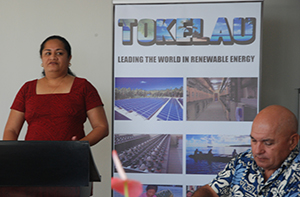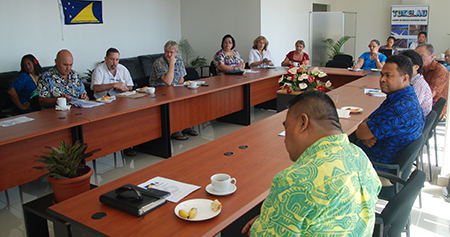Home > Bulletin > August 2014 (pre-SIDS) > Tokelau kicks off SIDS side events with presentation on Renewable Energy
Tokelau kicks off SIDS side events with presentation on Renewable Energy
Apia, 22 August 2014
Not only is the Tokelau’s renewable energy project proud of what it has achieved; it was also declared winner of the 2014 Renewable Energy Award of NZ’s Energy Efficiency and Conservation Authority (ECCA). Tokelau could not have done this alone, even though its political will and community ownership largely led to its success. The project has demonstrated a partnership between the leaders of Tokelau and their people, between Tokelau and New Zealand, and between Tokelau and renewable energy partners.
The General Manager of the Tokelau office, Joe Suveinakama also announced the start of the Tokelau Energy Support Project between Tokelau and the United nations Development Programme (UNDP). This will ensure putting together a new energy policy, and provide ongoing monitoring and demand-side management of the renewable energy system.
See also: article in Samoa Observer, 27 August 2014 (pdf, 630KB)
| Today the Tokelau Office in Apia’s SNPF plaza has opened a special meeting facility. It is meant for relevant side events to the Third Small Islands Developing States (SIDS) conference starting off in Apia next week. Dignitaries such as the NZ High Commissioner, the local Representative of UNDP, representatives of UN, FAO, Samoan Government and SPREP were treated to two presentations on renewable energy. Speakers were Ms Sili'a Kilepoa Ualesi of the Secretariat of the Pacific Regional Environment Programme (SPREP) and Mr Robin Pene, Energy Director in Tokelau. |
 |
Speakers and some of the attendants of the renewable energy seminar in Tokelau meeting room at SNPF Plaza, Apia set up for the duration of SIDS. |
| Tokelau’s Renewable Energy Project (TREP) was completed in 2012. Its intent was two-fold. Firstly it demonstrates that it is both economically viable and operationally sustainable to dramatically reduce reliance on fossil fuels. Secondly, and equally importantly, it shows Tokelau’s “commitment through action” to mitigate the effects of climate change. TREP worked closely together with SPREP to ensure regional information flow and cooperation, via their programme called to PIGGAREP (Pacific Islands Greenhouse Gas Abatement through Renewable Energy Programme). |
 |
The General Manager of the Tokelau office, Joe Suveinakama also announced the start of the Tokelau Energy Support Project between Tokelau and the United nations Development Programme (UNDP). This will ensure putting together a new energy policy, and provide ongoing monitoring and demand-side management of the renewable energy system.
See also: article in Samoa Observer, 27 August 2014 (pdf, 630KB)
